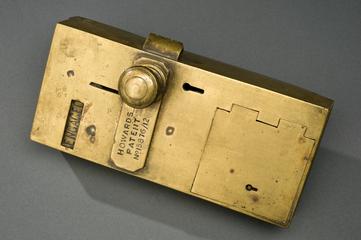
Electric wheelchair for use with adapted Mini Clubman car for Ed Freeman
- Made:
- 1978-1985 in unknown place
Electric wheelchair for use with adapted Mini Clubman car for Ed Freeman, who lives with impairements caused by the drug compound thalidomide, unknown maker, 1978-1985
“When you’ve worn [artificial limbs] from the age of two, it’s like a second skin. you just don’t want to give them up, and I thought I’d be losing a lot by giving them up. Once I went into an electric wheelchair, my freedom really did start.” Ed Freeman talking during the Thalidomide Society’s ‘Thalidomide Survivors Oral History’ project
To allow for this electric wheelchair to fit inside his car, teenage Ed Freeman’s Mini Clubman had to have the floor lowered and a ramp attached. His car was adapted for his use with all the controls moved to be accessible. For many people living with thalidomide impairments, there is a huge financial cost to purchasing and maintaining their wheelchairs.
Ed Freeman was one of at least 500 children in Britain born with impairments caused by thalidomide. His mother had pneumonia while pregnant with him, and took thalidomide to help her sleep on medical advice. After just two tablets, her hands started to tingle so she stopped. Unknown at the time this caused impairments to Ed. He and his family continue to be active in the Thalidomide Society, campaigning for people living with thalidomide impairments and their families. Ed is a father to two children, stepfather to two further children and a graphic artist.
Thalidomide was a compound found in drugs prescribed to people in the late 1950s and early 1960s. Although today it is associated primarily as a treatment for pregnancy related nausea, it was also prescribed to anyone experiencing symptoms of colds, flu, headaches, anxiety, and insomnia. Thalidomide causes nerve damage in the hands and feet of adults, but when taken in early pregnancy it causes impairments such as limb difference, sight loss, hearing loss, facial paralysis, and impact to internal organs. One tablet is enough to cause significant impairments. Researchers later identified that there was a link between the impairment a person is living with, and which day of the pregnancy thalidomide was taken. UK distributors withdrew the drug in 1961 and a government warning was issued in May 1962.
Details
- Category:
- Public Health & Hygiene
- Object Number:
- 2003-7
- Measurements:
-
overall: 800 mm x 420 mm x 600 mm,
- type:
- motorised wheelchair and thalidomide
- credit:
- Mr. Ed Freeman




